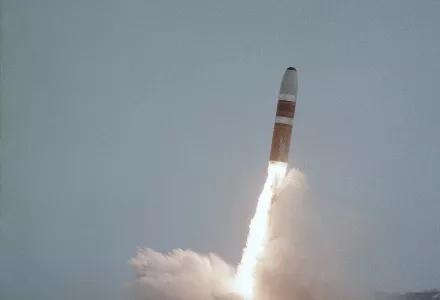Nuclear Platform Diversification: A New Dataset
A Project on Managing the Atom (MTA) seminar with David Arceneaux, postdoctoral research fellow with MTA and the International Security Program at the Belfer Center for Science & International Affairs.
A Project on Managing the Atom (MTA) seminar with David Arceneaux, postdoctoral research fellow with MTA and the International Security Program at the Belfer Center for Science & International Affairs.

The deterrent capacity of a state’s nuclear forces depends upon the platforms and delivery systems that constitute the arsenal. Despite the importance of specific platforms for nuclear deterrence and coercion, however, most quantitative research on the effects of nuclear weapons typically evaluate the deterrent power of nuclear weapons by measuring whether a state possesses nuclear weapons or the number of warheads within a state’s nuclear arsenal. In this seminar based on work with co-author Kyungwon Suh, David Arceneaux argues that such measures of nuclear capabilities are inadequate for evaluating the consequences of nuclear proliferation for broader outcomes of deterrence and coercion. He presents a new dataset of nuclear platform diversification that measures the possession of seven nuclear capabilities across all nuclear powers from 1945-2020, including: submarine-launched missiles, strategic land-mobile missiles, rapid fueling technologies, nuclear-tipped cruise missiles, multiple independently targetable reentry vehicles, deliverable strategic nuclear weapons, and tactical nuclear weapons. These platforms strengthen the operational requirements of nuclear deterrence by contributing to the survivability, penetrability, and range of a state’s nuclear arsenal. This project also conducts an empirical application to illustrate the utility of the dataset. Specifically, this project shows how nuclear platform diversification enables nuclear-armed states to dissuade nuclear proliferation by strengthening the credibility of nuclear security guarantees and reducing incentives for states to develop nuclear weapons.
David Arceneaux is a postdoctoral fellow with the Belfer Center's Project on Managing the Atom and International Security Program. David holds a Ph.D. in political science from Syracuse University. He is currently developing a book project on the origins of command and control systems in regional nuclear powers. David was previously a predoctoral fellow at the MIT Security Studies Program. His research is supported by the Charles Koch Foundation, and he has previously received support from the Smith Richardson Foundation and Tobin Project, among others. He will join the University of Colorado, Colorado Springs in fall 2021 as an assistant professor of political science.